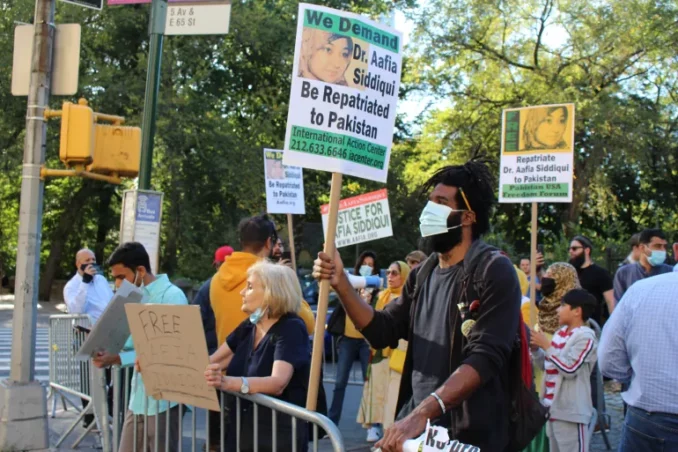Surviving state violence: The case of Dr. Aafia Siddiqui

Aafia Siddiqui supporters protest in front of the Pakistan Consulate at the United Nations in New York City, Oct. 20, 2021.
The following remarks were made by Tania Siddiqi on a March 24, 2025, webinar entitled “Surviving State Violence: The Case of Dr. Aafia Siddiqui and Incarceration in Women’s Prisons” sponsored by Haymarket Books, Texas People’s Tribunal and Missouri Justice Coalition.
Siddiqi is an attorney and the Founder and Executive Director of the Texas People’s Tribunal. Her work focuses on creating and implementing effective strategies against state violence. She has led both regional and international movement-centered initiatives. Siddiqi is the editor of “#WithoutJustCause: The Case of U.S.-Held Political Prisoner Dr. Aafia Siddiqui.”
Dr. Siddiqui is a Pakistani Muslim woman who is currently serving an unjust 86-year sentence at the only federal medical prison in the United States, FMC Carswell, notoriously known as the “Hospital of Horrors.” You can watch and share the entire zoom meeting at youtube.com/watch?v=ZOGW633rRh0.
I am very grateful to be a part of this discussion, and I appreciate that this event is taking place in March.
This year, March coincides with the blessed month of Ramadan. For those of us who are Muslim, it’s a time of deep reflection and an opportunity to assess how we can better ourselves to better our communities. International Women’s Day is celebrated on March 8, commemorating women workers for their contributions to furthering liberation efforts.
This month, March 2025, also marks the 22nd year that Aafia and her family’s lives were permanently altered.
Tonight I want to share information about Dr. Aafia, a Pakistani Muslim woman, explain how she ended up at FMC Carswell and shed light on how she’s been treated at the only federal medical prison for women, notoriously known as the Hospital of Horrors.
The legal injustice that plagues Aafia’s case began in 2003, when she and her children — Ahmed, who was 5 years old, Mariam, who was 3 years old and Suleman, who was 6 months old — were in a taxi in Karachi, Pakistan, heading to the airport to fly to Islamabad.
Aafia, an educator who received her Ph.D. from Brandeis University in cognitive neurosciences, was going to meet with the education ministry to discuss her ideas for Pakistan’s education system. Along the way, their taxi was stopped. Aafia’s kidnappers forcibly removed her from the car. Her children were dealt with in the following manner:
Suleman, who was in Aafia’s arms, was “thrown to the ground and left for dead.” This was the last time Aafia — or anyone else — saw six-month-old Suleman. He is presumed dead.
The kidnappers took Ahmed from Karachi, Pakistan, to Kabul, Afghanistan, and put him in a juvenile prison. According to Clive Stafford Smith, Aafia’s attorney, “They told him that his name was no longer Ahmed Siddiqui, it was Ali, and if he ever said it was Siddiqui they would kill him.”
Ahmed was confined to that prison for five years, until Dr. Fowzia, Aafia’s sister and the leader of the Aafia Movement, was able to locate him.
To find Ahmed, Fowzia contacted humanitarian organizations and provided them with family pictures. A woman working with the International Committee of the Red Cross (ICRC) identified someone who looked like Ahmed in an Afghan prison.
The woman from the ICRC showed Ahmed the pictures and asked if he recognized Fowzia in a photo. He told the woman that he did not recognize Fowzia, and that his name was Ali. As the woman was leaving, Ahmed asked her if he could keep Fowzia’s picture.
After learning about this encounter, Fowzia called the prison to talk to Ahmed. Ahmed was close to his Aunt Fowzia and called her “Adda,” a term of endearment that he made up. During their conversation, Ahmed called Fowzia this nickname. This is what led to Ahmed’s reunion with his family.
Mariam, Aafia’s middle child, was taken from Pakistan to Afghanistan and forcibly adopted into a white Christian American family by “a guy called Josh and a woman named Natalie.” Mariam was reunited with her family in 2010 when she was dropped outside of Fowzia’s house in Karachi with a tag around her neck bearing Fowzia’s address.
Unspeakable acts of torture
After being kidnapped, Aafia was held in secret prisons, including the notorious Bagram U.S. Air Base, where she endured unimaginable acts of violence.
After years of secret confinement, Aafia reappeared in 2008 but was taken into custody again, this time for baseless charges related to an incident that took place on July 18, 2008, when she allegedly attempted to shoot at U.S. personnel. During the supposed exchange, Aafia was the only person shot, not once but twice.
To treat her gunshot wounds, Aafia was taken to Craig Joint Theater Hospital at Bagram Air Base, the same place where she was tortured for numerous years. Reportedly, Aafia was a three on the fifteen-point Glasgow Coma Scale, meaning she was almost dead.
The surgeons opened her up from breastbone to belly button, searching for bullets. They cut out twenty centimeters of her small intestine. They also gave her transfusions of red blood cells and fresh frozen platelets and dosed her with clotting medication, which suggests she had experienced heavy blood loss.
According to her lawyer, the U.S., without any legal jurisdiction, shot and flew Aafia, a Pakistani citizen, from Afghanistan to the U.S. without any extradition proceedings.
In 2010, Aafia was convicted and sentenced to 86 years in a U.S. federal prison, despite a complete lack of forensic evidence and no credible witness testimony. Sara Flounders, co-director of the International Action Center, attended Aafia’s trial and described it as a “farce.”
Since her sentencing, Aafia has been confined at the Hospital of Horrors and continues to face incredible harm. She has been held in solitary confinement for over 14 years, according to her lawyer. This is longer than any person in a U.S. federal women’s prison. She has been kept from practicing her faith, even when religious leaders like Imam Omar Suleiman have offered to minister to her.
Aafia has also endured both sexual and physical abuse by state actors. Her attorney has stated that Carswell prison staff have raped her countless times. Aafia has been denied medical and psychological care, despite suffering severe trauma and physical injuries.
Often, when I share information about Aafia, people will tell me that it’s hard to advocate for her because of how her case has been framed. Aafia’s legal injustice started during the height of the global war on terror [following 9/11]. Despite being innocent and having never been convicted, let alone charged with, any act of terrorism, news media labeled her as “Lady Al-Qaeda” and “Mom Al-Qaeda,” essentially painting her as a “bad victim.”
In these moments, I think about Aafia’s captivity, measured by the timeline of my life. I was in elementary school when she was kidnapped, middle school when she reappeared and was shot twice and high school when she was given her unjust sentence. I am now a licensed attorney. The inhumane treatment and captivity that Aafia has endured has surpassed my childhood and adolescence and continues well into my adulthood. Isn’t it time that we demand justice for Aafia?
Aafia’s case is extraordinary for several reasons, but it parallels abuse and neglect that countless others endure at the Hospital of Horrors.
Optics should not determine whether someone is worthy of safety or redress.
It is wrong that Aafia is held without just cause. And it is wrong that she and others who are confined at FMC Carswell endure unbelievable acts of violence at the hands of government employees.
Follow this case at www.aafiamovement.com. Send letters to Aafia to letters4aafia@gmail.com
These remarks were slightly edited.

Tania Siddiqi. PHOTO: Kathryn Way

